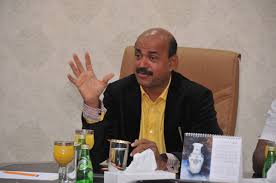Mangaluru, Jun 1: Rubbishing the reports of chief minister Siddaramaiah warning him over the candidature of his billionaire brother BM Farooq in the Rajya Sabha elections on Janata Dal(Secular) ticket, Mangaluru North MLA BA Mohiuddin Bava said that the CM's remarks were exaggerated by the media.
 Speaking to media persons here on Wednesday, termed the media reports that Siddaramiah lashed out at him during the Congress Legislature Party (CLP) meeting held in Bengaluru recently as mere figment of imagination.
Speaking to media persons here on Wednesday, termed the media reports that Siddaramiah lashed out at him during the Congress Legislature Party (CLP) meeting held in Bengaluru recently as mere figment of imagination.
Mr Bava, however, admitted that being a senior Congress leader, Mr Siddaramaiah asked him to convince Mr. Farooq to withdraw his nomination.
"I had informed the CM about Farook's decision to contest the RS polls. The CM apparently did not take the information then seriously. At that time, the Congress had also not decided on its candidates," he said.
The MLA asserted that his ties with his younger brother are personal and never financial, political or business-related.
He said Mr. Farooq had neither been in politics nor was he a member of any political party. However, he has been friends with the former Chief Minister H.D. Kumaraswamy for many years. Mr. Farooq is free to pursue his political interests, Mr. Bava said.
At the same time, he would remain a staunch Congressman and would vote for the official candidate of the party in the Rajya Sabha elections, Mr. Bava clarified.




Comments
Bava, please stop your drama, since it's raining you can't arrange cricket matches so start calling press conferences. We all knew about you, your benami buisness, your brother Farook a buisness etc,
During last assembly election you were in touch with JD(S) in case congress go for Honest candidate Vijay Kumar Shetty, but unfortunately congress bow to religious leaders intervention.
M. Bava is perfectly right. Every one is having their own decision
These Politicians all are Directors of Circus, we are Jokers...........
he can double up his wealth soon.
convincing for what? to join congress :P
totally not true, bava was always scolded by siddaramaiah for his mistake, now his brother is entering the circus.
Add new comment